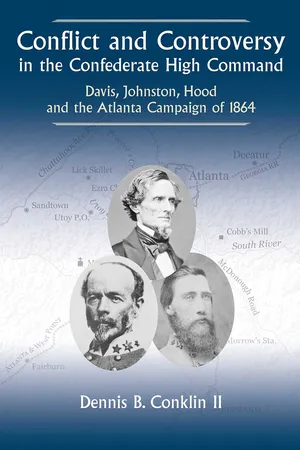
Conflict and Controversy in the Confederate High Command
Davis, Johnston, Hood and the Atlanta Campaign of 1864
- 289 pages
- English
- PDF
- Available on iOS & Android
Conflict and Controversy in the Confederate High Command
Davis, Johnston, Hood and the Atlanta Campaign of 1864
About this book
The Atlanta Campaign of 1864 played a pivotal role in shaping the outcome of the American Civil War and bolstering Abraham Lincoln's reelection in November, securing the path to eventual Union victory. Long overshadowed, this Georgia campaign has experienced a resurgence of interest over the past decade. Dennis B. Conklin contributes to this growing body of scholarship with Conflict and Controversy in the Confederate High Command: Davis, Johnston, Hood, and the Atlanta Campaign of 1864. Conklin's account, originally a Ph.D. dissertation, examines the dysfunctional relationships that plagued the Confederate high command, contributing to the defeat of the Army of Tennessee and the loss of Atlanta, a vital logistical rail hub. He highlights critical flaws in Jefferson Davis's leadership and the deep mutual distrust between the Confederate president and Joseph E. Johnston, commander of the Army of Tennessee, which led them to work at cross purposes. As the campaign slowly unfolded and William T. Sherman's advancing armies claimed vast swaths of territory, tensions escalated among Davis, Johnston, corps commander John Bell Hood, and Georgia Governor Joseph Brown, further compounding the Confederacy's strategic woes. Davis's initial unease with Johnston's leadership partly explains why he promoted Hood to command an infantry corps in the principal Western army before the campaign began. Hood, who had honed his skills as a tactical commander under the aggressive Robert E. Lee in the Army of Northern Virginia, grew increasingly exasperated by Johnston's repeated withdrawals. This tension, Conklin argues, culminated in their inevitable clash at Cassville—a pivotal dispute driven by inconsistent maps and divergent battlefield philosophies. The ensuing correspondence among key figures in Richmond further eroded Davis's confidence in Johnston, paving the way for Hood's eventual rise to command the Army of Tennessee. Conflict and Controversy in the Confederate High Command offers a compelling and briskly paced exploration of command politics, human nature, and the pressures of war, illuminating how these forces shaped the outcome of one of the Civil War's most consequential campaigns.
Frequently asked questions
- Essential is ideal for learners and professionals who enjoy exploring a wide range of subjects. Access the Essential Library with 800,000+ trusted titles and best-sellers across business, personal growth, and the humanities. Includes unlimited reading time and Standard Read Aloud voice.
- Complete: Perfect for advanced learners and researchers needing full, unrestricted access. Unlock 1.4M+ books across hundreds of subjects, including academic and specialized titles. The Complete Plan also includes advanced features like Premium Read Aloud and Research Assistant.
Please note we cannot support devices running on iOS 13 and Android 7 or earlier. Learn more about using the app.
Information
Table of contents
- Cover
- Book Title
- Copyright Page
- Table of Contents
- Acknowledgments
- Introduction
- Chapter 1 Structural Damages
- Chapter 2 Reorganization of the Officer Corps: A Spy Is Born
- Chapter 3 Spring Plans: The Absence of a Unified Vision
- Chapter 4 Dalton to Adairsville: Maps, Militia, and Maneuver
- Chapter 5 Controversy at Cassville
- Chapter 6 Cassville to the Chattahoochee and Johnston’s Removal
- Chapter 7 With Drawn Sabers Flashing in the Light
- Conclusion
- Appendix 1 Polk’s and Longstreet’s Plansfor a Spring Offensive
- Appendix 2 The Mackall Journal Reconsidered
- Bibliography
- Index
- About the Author